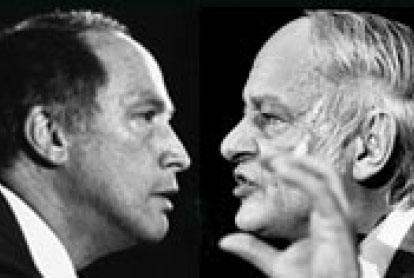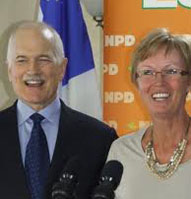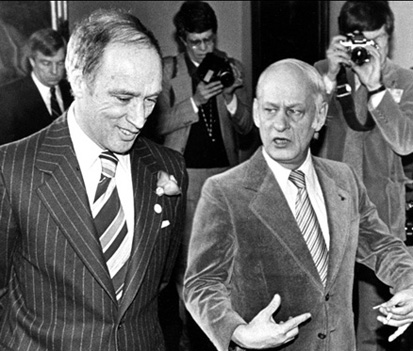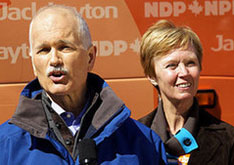New NDP interim leader Nycole Turmel’s Bloc past shouldn’t matter .. but in real world of Canada right now it probably does?
Aug 3rd, 2011 | By Randall White | Category: In Brief
"René Lévesque et Pierre Elliott Trudeau ont profondément marqué l’histoire contemporaine du Québec et du Canada."
If Canada already were the country of the future it could be – and should eventually become – the news that federal NDP interim leader Nycole Turmel was until recently also a member of the Bloc Québécois (and is apparently still on the books of the vaguely sovereigntist provincial party, Québec Solidaire) would not be damaging to the party Jack Layton still hopes to lead to greater things, when he recovers from his current bout with cancer.
On November 27, 2006, for instance, the Canadian House of Commons “overwhelmingly passed a motion recognizing [the] Québécois as a nation within [a united] Canada … Conservatives, most Liberal MPs, the NDP and the Bloc voted 266 to 16 in support.” Five days before Prime Minister Stephen Harper himself had declared :“The question is a straightforward one: do the Québécois form a nation within a united Canada? The answer is yes.”

Jack and Nicole : as Prime Minister Harper himself has said: “do the Québécois form a nation within a united Canada? The answer is yes.”
It is only a very short step from here to the practical recognition that, as francophone Quebecers of various stripes have long maintained, Quebece is not a province like the others. Some day in our ultimate wisdom we Canadians outside Quebec are going to happily enough accept the plain truth that Quebec’s attachments to Canada are inevitably somewhat different from those of other provinces – but nonetheless strong and enduring, and indeed patriotic. (Today’s Quebecers are the descendants of the first people who called themselves Canadians – a historical fact that will never change.)Â And when we do, Canadian “national unity” will be stronger than ever before – and more than strong enough to last as long in Quebec as in any other province.
In this same spirit it does seem worth underlining that for even longer than she has been a member of either the Bloc Québécois or Québec Solidaire, Nycole Turmel has also been a member of the New Democratic Party of Canada (since 1991, in fact: her ties to the Bloc go back less than five years before this past January, when she gave them up). This cluster of past memberships apparently breaks NDP rules, technically as it were. But it also fits very nicely with the new political truth that the Québécois constitute a nation within a united Canada!

Prime Minister Trudeau (left) and Quebec Premier Rene Levesque who appear to be starting their debate early as they arrive for dinner at Government House in Ottawa, ON, Jan.4, 1979. THE CANADIAN PRESS/ Peter Bregg.
All this having been said, Canada is still not the country of the future it could be quite yet. Many of us outside Quebec remain attached to an abstract old vision of Canadian national unity that has never worked and never will, but still seems important in the real world of practical politics – especially, as the Alberta political science professor Duane Bratt has suggested, “the further west you get from Quebec.” And, as the eminent Ontario political journalist John Ibbitson has just noted, the May 2, 2011 Canadian federal election has now “revealed that it is indeed possible for a party to form a majority government without Quebec’s support” (even if this government has still won less than 40% of the cross-Canada popular vote!).
So we have such headlines as “Turmel’s Bloc past badly wounds the NDP” (in the Toronto Star) and “Dalliance with separatists could spell trouble for NDP” (in the Vancouver Sun). And who doubts that there are still some damaging real bullets in the air when Dimitri Soudas, spokesman for Prime Minister Stephen Harper, tells anyone who will listen that: “This is yet another worrying example of the NDP not being up to the job of governing Canada when its interim leader was a full member of the sovereigntist Bloc Québécois just a few short months ago.”

“NDP Leader Jack Layton appears with Hull-Aylmer candidate Nycole Turmel during a campaign stop in the Outaouais, Sunday, April 3, 2011. Turmel won her riding by a landslide.”
And yet again time may finally tell that Jack Layton did the Canadian future a great service when he appointed Nycole Turmel interim NDP leader during his second struggle with cancer – being “well aware” of her complex Quebec political past “when he promoted her as his replacement last week.” Whatever else, the November 27, 2006 resolution of the federal Parliament on the Québécois nation within a united Canada finally made clear that neither Pierrre Trudeau nor René Lévesque won the great battle over Federalism and the French Canadians in the last quarter of the 20th century. The future is going to be some characteristically Canadian compromise between their two conflicting visions.
Another crucial thing about the May 2, 2011 Canadian federal election is that the people of Quebec voted to start exploring the specific practical meanings of this compromise, through the New Democratic Party of Canada. And what Mr. Layton just may have grasped in his unusual appointment of Ms. Turmel is that focusing on this exploration is the best chance there is for the future of both his party and Canada at large.


Again, I can’t help my self but to congratulate you for the quality of this website.
Knowing that this point of view somehow exists outside of the Québec province, I think there is some place for hope.